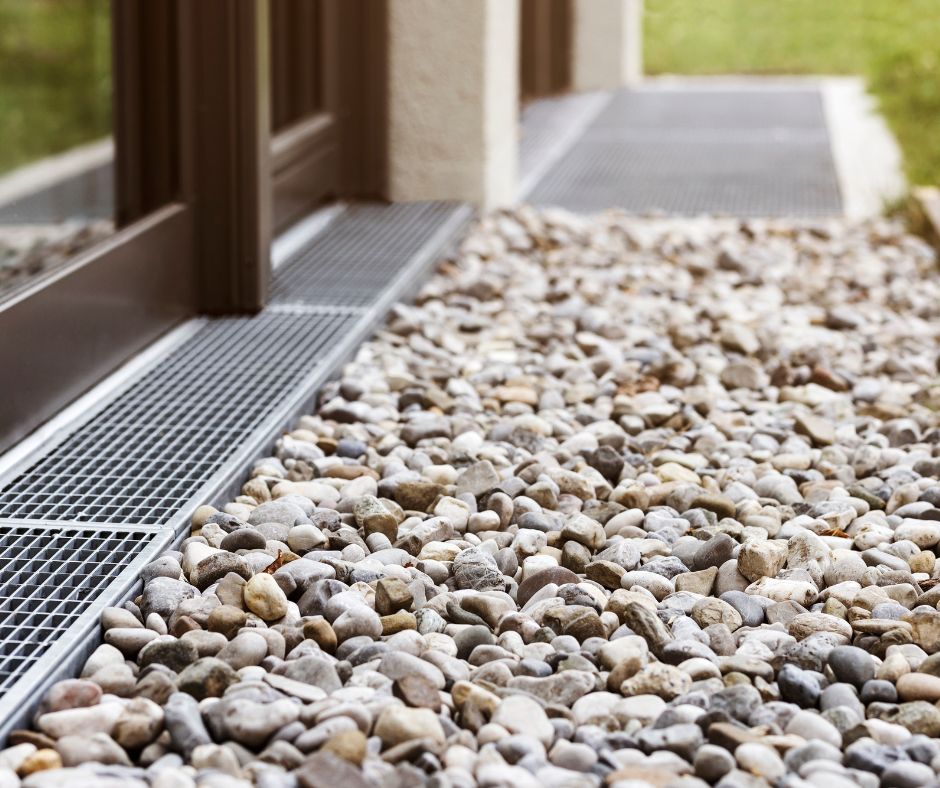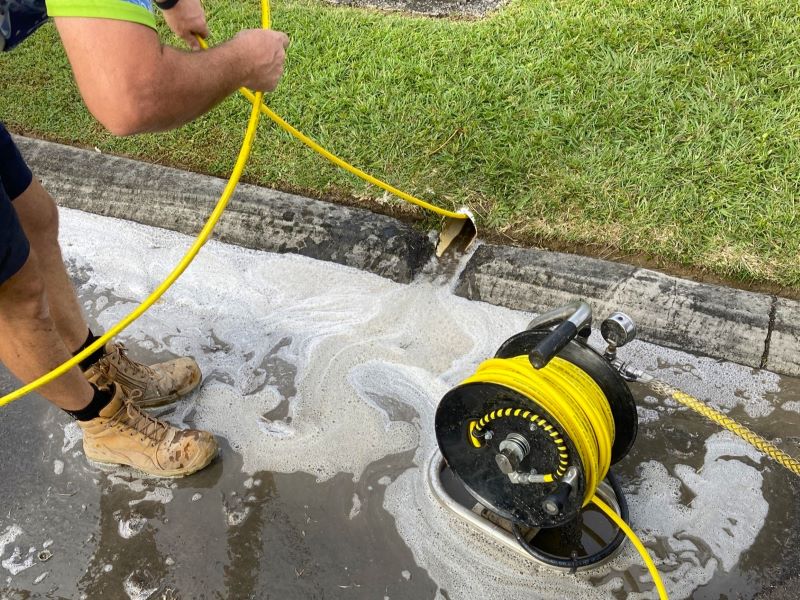Stormwater drainage systems encompass components such as roof plumbing drainage, French drains, spoon drains, and strip drains. These elements are crucial in preventing water damage and effectively managing stormwater runoff. Regular maintenance is essential, as neglect can lead to severe issues like drain blockages and even flooding. Whether you're contending with clogged grates, intrusive roots in your pipes, or damaged plumbing, proactive maintenance can save you from future headaches and costly repairs.
Here's a comprehensive guide on keeping these drainage systems operating efficiently and actionable steps to take if a blockage occurs.

Essential Strategies for Maintaining Your Traditional Stormwater Drains
Traditional stormwater drains are integral to most properties, effectively diverting rainwater away from structures and preventing flooding. However, over time, these systems can become obstructed by various debris, such as leaves, dirt, and branches, hindering their functionality. Regular upkeep is vital for ensuring that water flows freely and does not accumulate near your home's foundation, which could lead to serious structural issues. Establishing a consistent maintenance routine will prolong the life of your drainage systems and enhance their performance, especially during heavy rainfall.
Tips for Traditional Drain Care:
- Clear the grates and gutters regularly. Accumulated leaves and debris can significantly impede water flow, so it's crucial to remove any buildup routinely, particularly after storms.
- Inspect for pooling water: Be vigilant for signs of water backing up or pooling near your drains, as this could indicate a blockage. Additionally, check for boggy areas in your garden, which may indicate underlying drainage issues that must be addressed.
- Call in the professionals: Scheduling routine inspections and cleanings with a qualified plumber like Creek to Coast will ensure your drains operate at peak efficiency and help you avoid potential problems.
Effective Maintenance Practices for French Drains
French drains are specifically engineered to redirect groundwater away from your home and retaining walls, making them highly effective for moisture management. However, these underground systems require regular care to remain free from blockages. French drains utilize a combination of gravel and a perforated pipe to facilitate water diversion. Still, they can clog from dirt, sediment, and roots over time. Maintaining these systems properly is crucial to their longevity and efficiency.
French Drain Maintenance Tips:
- Inspect for slow drainage: If water is not draining as expected, it might indicate a clog within your French drain system that needs immediate attention.
- Flush the system regularly: Periodically running water through the drain can help clear potential blockages before they escalate into serious issues.
- Hire a plumber for deep cleaning: If you notice sediment buildup or root intrusion, reach out to Creek to Coast for a thorough cleaning, potentially employing hydro-jetting tools to clear the pipes or inspection points effectively.
Best Practices for Maintaining Spoon Drains
Spoon drains consist of shallow, curved channels designed to efficiently guide surface water away from driveways, patios, and other paved areas. Although they are generally low-maintenance, it is important to attend to them regularly to prevent clogging. Neglecting to clear these channels can result in water pooling on your property, leading to potential damage over time. Adopting simple maintenance habits ensures that your spoon drains remain practical and operational.
Spoon Drain Maintenance:
- Keep the channel free of debris: Regularly sweeping out leaves, dirt, rocks, or rubbish will help maintain smooth water flow. A high-pressure washer can be particularly effective for thorough cleaning.
- Check the slope: Since spoon drains rely on gravity to direct water, ensure the slope is intact and functioning as intended.
- Check for damage: Inspect the drain for cracks or breaks. They are often subjected to vehicle traffic, which can compromise their integrity.
- Professional assessment: If you notice that water is not draining properly, it may be time to call Creek to Coast for a professional evaluation. Their expertise will help you make necessary adjustments or repairs to restore optimal drainage.
Key Steps for Maintaining Linear Drains
Linear drains, also called trench drains, are strategically installed in areas such as driveways and pool decks to capture surface runoff effectively. Although they efficiently prevent water accumulation, they can gather debris over time, requiring periodic cleaning to maintain their functionality. Regular maintenance is essential to ensure that these drains are not obstructed, which can lead to water pooling and potential damage to surrounding areas. Establishing a consistent cleaning routine will enhance their performance and longevity.
Linear Drain Care:
- Clean grates frequently: Monitor the grates for any buildup of dirt, leaves, or debris that could obstruct the drain's flow, and remove these blockages regularly.
- Flush the system: Routinely running water through the drain will help ensure it flows correctly and that no blockages are present.
- Professional maintenance: If you experience backups or slow drainage, don't hesitate to contact Creek to Coast for expert cleaning services to remove deep clogs and debris.
Immediate Actions for Addressing Blocked Drains
Despite your best maintenance efforts, blockages can still arise in any drainage system. Signs such as water pooling, slow drainage, or overflowing grates indicate that immediate action is required to prevent more severe issues. Understanding the common causes of blockages can help you identify the problem and take the necessary steps to resolve it effectively.
Causes of Blockages:
- Tree roots: Roots can infiltrate underground pipes, leading to significant blockages that disrupt water flow.
- Debris buildup: Leaves, dirt, and other environmental materials can accumulate over time, obstructing the passage of water through your drainage system.
- Pipe damage: Broken or squashed pipes can severely restrict water flow and require immediate professional intervention.
When faced with a blockage, it's advisable to seek assistance from a professional plumber like Creek to Coast. They utilize advanced tools such as high-pressure water jetters and CCTV cameras to diagnose and remedy the issue accurately.
Attempting to resolve a blockage alone can exacerbate the problem significantly if the pipes are already damaged or roots have infiltrated the system.

Comprehensive Tips for Maintaining All Types of Stormwater Drains
To ensure your stormwater management systems—whether traditional, French, spoon, or linear drains—continue to function effectively, consider implementing the following strategies:
- Schedule annual inspections and cleanings with a licensed plumber like Creek to Coast. This proactive approach helps remove debris and identify potential issues before escalating.
- Pay attention to water flow: After heavy rainfall, inspect your drains for pooling or slow drainage, which may indicate underlying problems.
- Install gutter guards and grates to prevent larger debris from entering your drains, thereby reducing the frequency of blockages.
- Keep plants and trees away: Roots from nearby trees can invade and obstruct pipes, so it's essential to maintain a safe distance between vegetation and your stormwater system.
Regular plumbing maintenance and prompt responses to drainage issues are critical for protecting your property from water damage and ensuring your drainage systems operate efficiently. If you detect any signs of blockage, don't hesitate to contact Creek to Coast for expert assistance in keeping your stormwater drains flowing smoothly!



The significance of stormwater drainage systems cannot be overstated, especially in an era where extreme weather events are becoming more common due to climate change. Your detailed overview of components like roof plumbing drainage, French drains, and the like resonates deeply, particularly with anyone who has faced the unfortunate consequences of neglecting these systems.
You make a really good point about the significance of stormwater drainage systems, especially given the increasing frequency of extreme weather events. It’s an area that often doesn’t get the attention it deserves until there’s a problem. I’ve seen how critical effective drainage can be; a friend of mine had a basement that flooded during a heavy storm simply because the existing drains couldn’t handle the volume of water. It drove home just how interconnected our infrastructure is with personal safety and property protection.
You’re spot on about the often-overlooked importance of stormwater drainage systems. It’s interesting how we generally don’t think about them until they fail in the face of a storm. Your friend’s experience really illustrates how interconnected our infrastructure is with personal safety. It reminds me of conversations I’ve had with urban planners who emphasize how vital it is for cities to adapt to climate change by upgrading these systems.
Your point about stormwater drainage systems really resonates with me. It’s so true that we often take these infrastructures for granted until something goes wrong. I remember a heavy storm a few years back that caused flooding in my neighborhood. It was a stark reminder of how reliant we are on systems that we rarely see or think about.
You’re right, the significance of stormwater drainage systems often gets overlooked until there’s an urgent need for them. Your friend’s experience really highlights that point. It’s a stark reminder that our weather patterns are changing and, with them, the demands we place on our infrastructure.
You’ve nailed it—often we don’t really grasp the importance of stormwater drainage systems until we see the chaos that can happen without them. It’s such a nuanced issue that often festers under the surface until a heavy rain reveals the cracks in our infrastructure.
You raise an important point about how easily we can overlook the critical role of stormwater drainage systems until we’re faced with a weather event that turns our streets into rivers. My friend’s experience was eye-opening and it sheds light on a larger issue—one that ties into planning and maintenance of our infrastructure in the face of changing climate conditions.
You’re right; stormwater drainage systems often take a backseat in our conversations about infrastructure until we face the consequences firsthand. Your friend’s experience with the flooded basement really highlights that interconnectedness between our infrastructure and personal safety. It’s surprising how much we rely on these systems without even thinking about them until they’re put to the test.
You bring up such an interesting point about the often-overlooked role of stormwater drainage systems in our everyday lives. It’s a bit startling, really, how we only pause to think about them when they fail. Your friend’s flooded basement must have been a real wake-up call about how interconnected everything is—our infrastructure, homes, and, by extension, personal safety.
This is such an important topic! Living in an area with heavy rainfall, I’ve learned just how vital stormwater drainage systems are. It’s fascinating to see how something so seemingly simple can have such a big impact on property and safety. I recently had to deal with a clogged French drain in my backyard, and it was quite the hassle—but it also gave me a chance to really appreciate how these systems work.
I found your insights on stormwater drainage systems really intriguing. It’s fascinating how crucial these components are to the overall health of our properties and urban environments. I remember when I moved into my first house, I had no idea how much I needed to pay attention to things like roof plumbing drainage and French drains until that heavy rain hit. The reality of finding a small lake in my backyard was a wake-up call – especially as I watched my dog trying to navigate through the puddles!
I found your insights on stormwater drainage systems to be incredibly relevant, especially as I’ve encountered some of these issues firsthand in my own home. Last summer, I faced significant flooding in my basement due to a blocked French drain—something I hadn’t thought to maintain regularly. It’s a real eye-opener how easily debris can accumulate and cause such stress.
I found your insights into stormwater drainage systems to be both enlightening and relevant, especially as we often take these crucial components for granted until a problem arises. It’s fascinating to think about how interconnected our management of stormwater is with broader environmental considerations. For instance, I’ve noticed in my own neighborhood that when drainage systems aren’t properly maintained, the resulting flooding can affect not just individual homes, but entire community infrastructures. In many cases, it leads to public health concerns, as stagnant water can become a breeding ground for mosquitoes and other pests.
I really appreciate your detailed breakdown of stormwater drainage systems and the importance of regular maintenance. It’s a topic that often flies under the radar until we find ourselves dealing with the consequences of neglect—like flooding or water damage in our homes. I’ve had my share of experiences with these issues; last fall, heavy rains overwhelmed my traditional stormwater drains, leading to water pooling around my foundation and causing quite a bit of stress.
It’s interesting to see how often stormwater drainage systems are overlooked until a problem arises. In my experience, I’ve found that regular inspections can make a big difference. For instance, I spend a few minutes each season checking my gutters and downspouts for blockages—it’s a small investment of time that can prevent costly water damage later on.
You’ve made a great point about stormwater drainage systems and the importance of regular inspections. It’s really true that a little bit of preventative maintenance goes a long way. I also check my gutters and downspouts, especially after heavy rains or storms. It’s surprising how quickly debris can accumulate and cause issues.
It’s interesting how often we overlook the importance of stormwater drainage until we face a significant issue ourselves. I had a situation last summer where heavy rains caused substantial water pooling in my yard, revealing just how clogged my drains were with debris. It was a wake-up call and made me realize that regular maintenance is as vital as any other home upkeep task.
This post beautifully highlights the often-overlooked importance of stormwater drainage systems in our everyday lives. It’s interesting to think about how these components quietly work behind the scenes, safeguarding our homes and neighborhoods from potential disasters before the rains even arrive. I remember a particularly heavy downpour a few years ago when I witnessed firsthand the consequences of neglecting proper drainage; my neighbor experienced significant flooding because their system was clogged with debris. That incident was a wake-up call, not just for them but for everyone in our community regarding the need for proactive maintenance.
You’ve touched on a crucial point about the silent role that stormwater drainage systems play in our lives. It’s easy to take them for granted until we witness the consequences of neglect, as you experienced with your neighbor’s situation. It’s striking how interconnected our infrastructure is with the health of our communities.
I have to say, whenever I think about stormwater drains, I can’t help but visualize a scene from a horror movie where they’re lurking under the surface, just waiting to unleash some chaos! But in reality, it’s the leaves and branches that do the real haunting. I remember the last time I neglected mine—suddenly I had a mini pond in my backyard, perfect for duck impressions but not much else!
It’s funny how stormwater drains can evoke that horror movie vibe when most of us don’t think of them in that way. It’s fascinating to consider how something so ordinary can become a source of creativity when we’re looking for inspiration or humor. Your description of having a mini pond is relatable—I’ve definitely had my own battles with leaves clogging up gutters and creating unexpected water features.
It is interesting how our everyday environments can transform into sources of inspiration, isn’t it? Stormwater drains do have that uncanny ability to evoke a certain atmosphere, especially when we think of classic horror tropes. It’s like they have this dual personality—just a mundane part of infrastructure during the day, yet they hold an air of mystery when the lights go down.